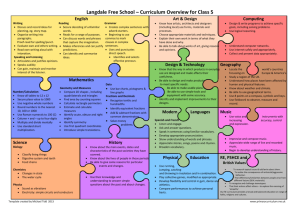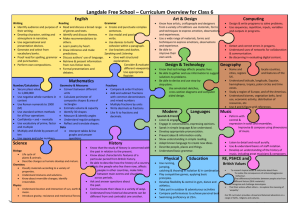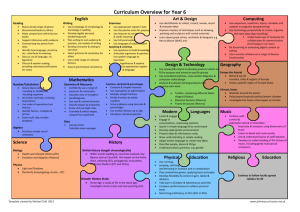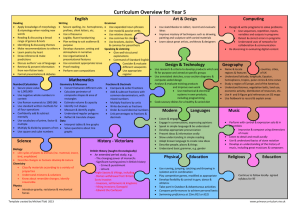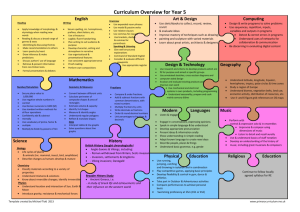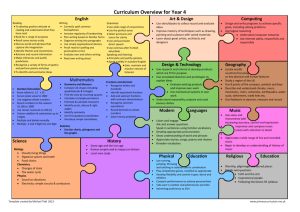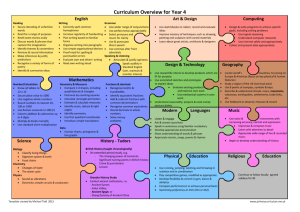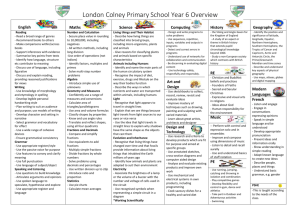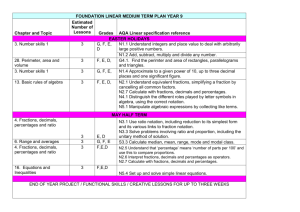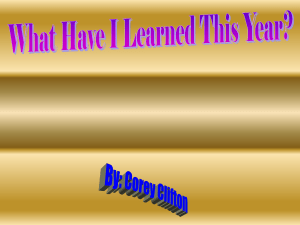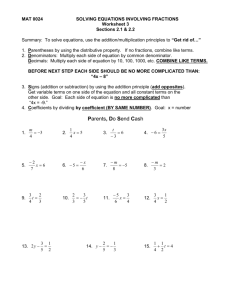Langdale Free School – Curriculum Overview for Class 7
advertisement
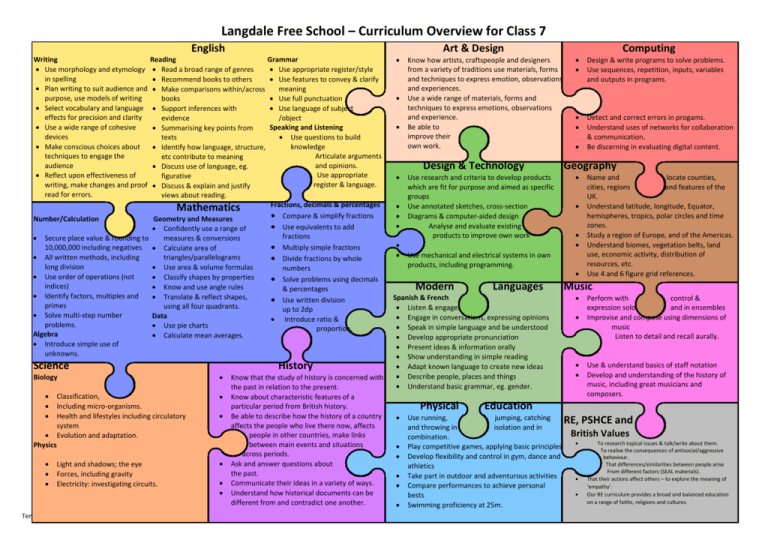
Langdale Free School – Curriculum Overview for Class 7 English Art & Design Writing Use morphology and etymology in spelling Plan writing to suit audience and purpose, use models of writing Select vocabulary and language effects for precision and clarity Use a wide range of cohesive devices Make conscious choices about techniques to engage the audience Reflect upon effectiveness of writing, make changes and proof read for errors. Reading Grammar Read a broad range of genres Use appropriate register/style Recommend books to others Use features to convey & clarify meaning Make comparisons within/across books Use full punctuation Support inferences with Use language of subject evidence /object Speaking and Listening Summarising key points from texts Use questions to build knowledge Identify how language, structure, Articulate arguments etc contribute to meaning and opinions. Discuss use of language, eg. Use appropriate figurative register & language. Discuss & explain and justify views about reading. Fractions, decimals & percentages Mathematics Compare & simplify fractions Number/Calculation Geometry and Measures Use equivalents to add Confidently use a range of fractions Secure place value & rounding to measures & conversions 10,000,000 including negatives Calculate area of Multiply simple fractions All written methods, including triangles/parallelograms Divide fractions by whole long division Use area & volume formulas numbers Use order of operations (not Classify shapes by properties Solve problems using decimals indices) Know and use angle rules & percentages Identify factors, multiples and Translate & reflect shapes, Use written division primes using all four quadrants. up to 2dp Solve multi-step number Data Introduce ratio & problems. Use pie charts proportion. Algebra Calculate mean averages. Introduce simple use of unknowns. Science History Biology Classification, Including micro-organisms. Health and lifestyles including circulatory system Evolution and adaptation. Physics Light and shadows; the eye Forces, including gravity Electricity: investigating circuits. Template created by Michael Tidd 2013 Know that the study of history is concerned with the past in relation to the present. Know about characteristic features of a particular period from British history. Be able to describe how the history of a country affects the people who live there now, affects people in other countries, make links between main events and situations across periods. Ask and answer questions about the past. Communicate their ideas in a variety of ways. Understand how historical documents can be different from and contradict one another. Know how artists, craftspeople and designers from a variety of traditions use materials, forms and techniques to express emotion, observations and experiences. Use a wide range of materials, forms and techniques to express emotions, observations and experience. Be able to improve their own work. Design & Technology Use research and criteria to develop products which are fit for purpose and aimed as specific groups Use annotated sketches, cross-section Diagrams & computer-aided design Analyse and evaluate existing products to improve own work Use mechanical and electrical systems in own products, including programming. Modern Languages Spanish & French Listen & engage. Engage in conversations, expressing opinions Speak in simple language and be understood Develop appropriate pronunciation Present ideas & information orally Show understanding in simple reading Adapt known language to create new ideas Describe people, places and things Understand basic grammar, eg. gender. Physical Computing Design & write programs to solve problems. Use sequences, repetition, inputs, variables and outputs in programs. Detect and correct errors in progams. Understand uses of networks for collaboration & communication. Be discerning in evaluating digital content. Geography Name and locate counties, cities, regions and features of the UK. Understand latitude, longitude, Equator, hemispheres, tropics, polar circles and time zones. Study a region of Europe, and of the Americas. Understand biomes, vegetation belts, land use, economic activity, distribution of resources, etc. Use 4 and 6 figure grid references. Music Perform with control & expression solo and in ensembles Improvise and compose using dimensions of music Listen to detail and recall aurally. Use & understand basics of staff notation Develop and understanding of the history of music, including great musicians and composers. Education Use running, jumping, catching RE, PSHCE and and throwing in isolation and in British Values combination. To research topical issues & talk/write about them. Play competitive games, applying basic principles To realise the consequences of antisocial/aggressive Develop flexibility and control in gym, dance and behaviour. That differences/similarities between people arise athletics From different factors (SEAL materials). Take part in outdoor and adventurous activities That their actions affect others – to explore the meaning of Compare performances to achieve personal ‘empathy’. Our RE curriculum provides a broad and balanced education bests on a range of faiths, religions and cultures. Swimming proficiency at 25m. www.primarycurriculum.me.uk Template created by Michael Tidd 2013 www.primarycurriculum.me.uk
